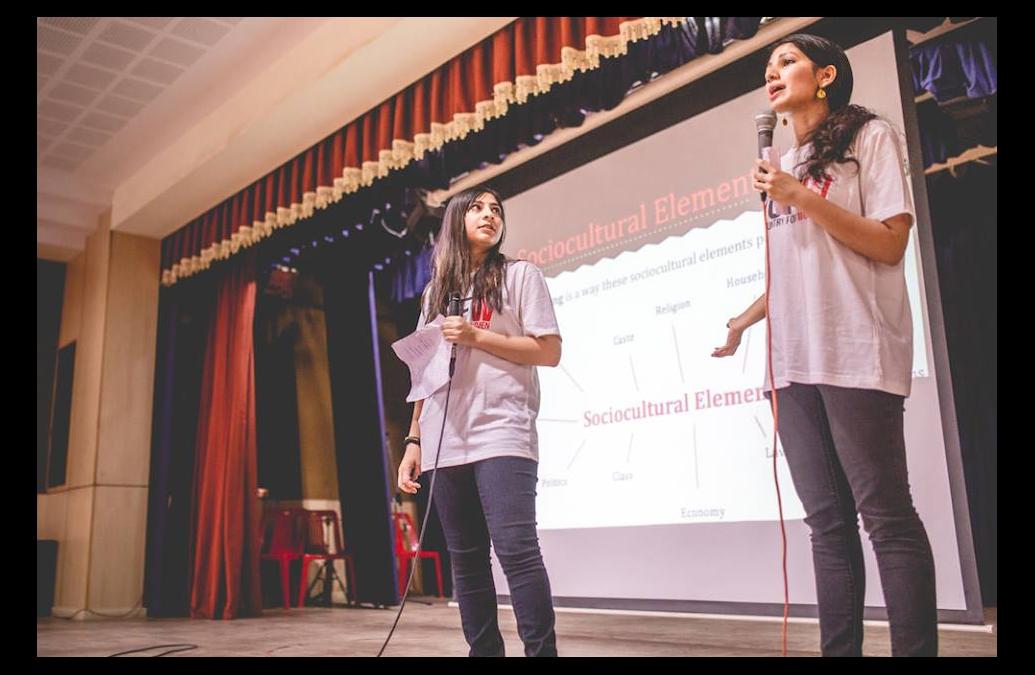5 Questions for Ria Vaidya ‘16

Ria is a 2015 Social Innovation Fellow and co-founder of No Country for Women (NCFW), an internationally-recognized gender education initiative that aims to combat systemic gender-based discrimination in India. Ria and her co-founder, Shreena Thakore ’16, who grew up in India, were awarded the Projects for Peace fellowship and used this grant to launch the project in May of 2014. NCFW was set up to educate the people in India on gender, rape culture, and misogyny through a series of workshops and initiate informed discussions about social change.
I was inspired by Ria’s story because she was determined to start a conversation about an issue in a country that fights hard to keep such issues silent and hidden. We reflected on Ria’s experiences, her interactions with young people, most of whom had never thought about this obvious form of discrimination before, and her moments of self-doubt and extreme conviction.
Nitya: When did you realize that NCFW was growing bigger than just a summer project?
Ria: Our first workshop in Bangalore received a very positive response which was great because up till that point, schools and administrators were absolutely refusing to work with us. After a few workshops, a documentary filmmaker contacted us and wanted to make a short film on No Country for Women and that video went viral. It was an easily packaged way for people to understand what we were doing - and from then on we started getting invited to speak in Delhi, Bombay, Calcutta, and many College Fests. I knew that there was so much potential to make an impact and our work shouldn’t just stop because the summer was over.
When you returned to Brown in the fall, was it difficult to contribute to NCFW when you were so far away?
Yes, it was extremely difficult. Shreena decided to stay back in India and continue the work while I came back to Brown because I didn’t want to put my education on hold. But I was still extremely busy working on NCFW, meeting with potential funders, talking to faculty members on how to expand the scope of the project, and building a toolkit. The time difference made it so hard to talk to the rest of the team in India. At that point, we had taken on five more people in India who were willing to help us with NCFW. So many days would go by without any communication between me and the rest of the team. And that was definitely not constructive.
Was there any specific moment where you thought “Wow, I’m actually making an impact on this person’s life?”
Absolutely. I felt like that in every single workshop I gave. I remember after our first workshop, a group of students gathered around us and started to tell us stories in which they had experienced discrimination. One of the girls mentioned that she was furious when a rickshaw driver kept staring at her legs but she felt she could not speak or do anything about it. Especially because of the backlash she would face for wearing clothes that exposed her legs anyway. They knew that these incidents were extremely unfair but they weren’t able to articulate that anger. It felt that now we had given them the tools to do that. And that was extremely fulfilling. After workshops, students were just always so happy and so excited. And they would say, “Wow, I never thought about this before” or “No one has ever said this to me before”. And it was very reassuring because we knew we could actually make an impact.
What about the opposite? Was there a moment where you were at the verge of giving up and feeling that you couldn’t do it anymore?
Oh yes, definitely. We held a day-long NCFW conference with multiple events that focused on gender, rape culture, misogynistic culture in India. And we did receive positive feedback. But it took such a toll on me. There were a number of people that were being really rude and saying offensive things and were trying to put us down. In general, even though NCFW got an overwhelmingly positive response, there was equal amounts of negativity. People with little education on the topic were attacking us and that’s more dangerous than having no education whatsoever. They said things like “Take your fake American accents and go back to the US because more rapes happen there.” That’s not even the point! Yes, rape happens everywhere but that doesn’t mean that we shouldn’t focus on what is happening in our own country. The misogynistic situation is objectively worse here. People were just so misinformed.
How did you push forward from all the negativity?
It was extremely difficult. But we pushed through because we had enough intelligent people supporting us. And when I say that, I honestly mean people from Brown. People in India did support us, but they did not totally understand what we were doing and where we were coming from. My friends from Brown would talk to me and kept encouraging me to not give up. They kept telling me that I was doing a great job and not to worry. They would laugh at the stupid comments with me. They got it. They understood.
